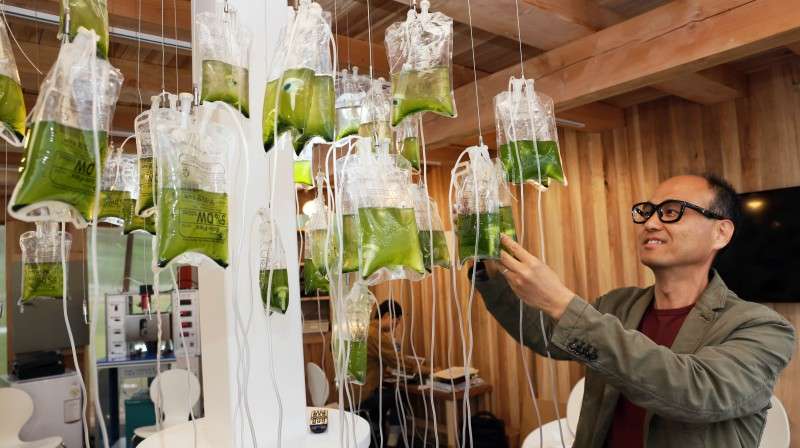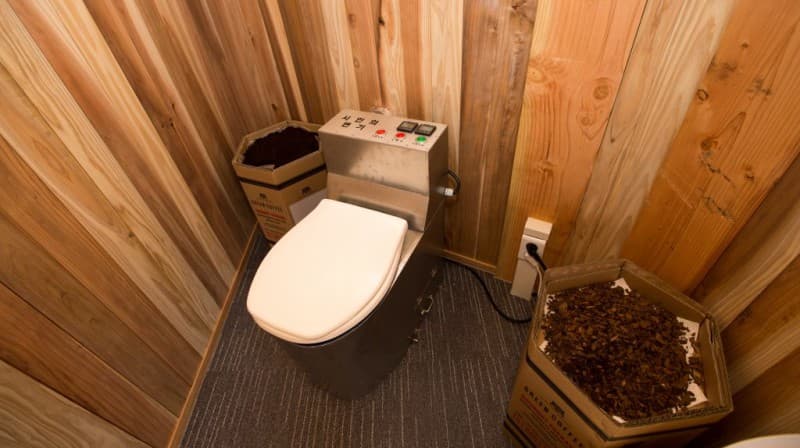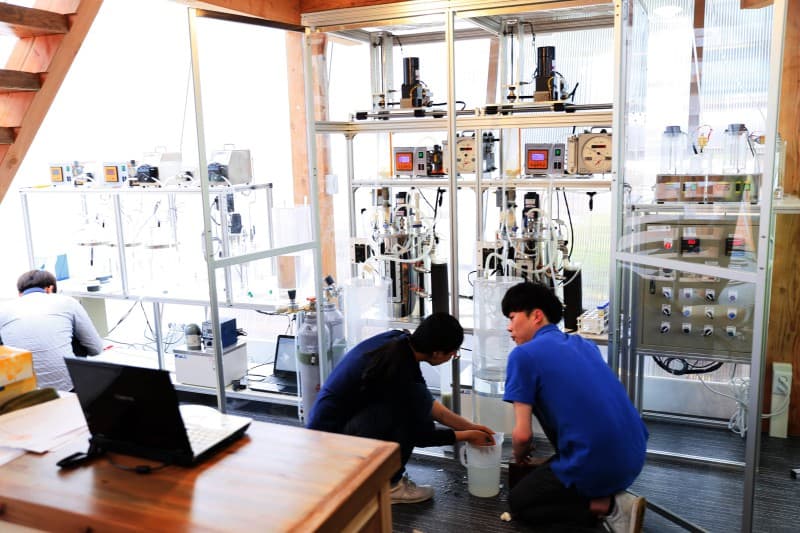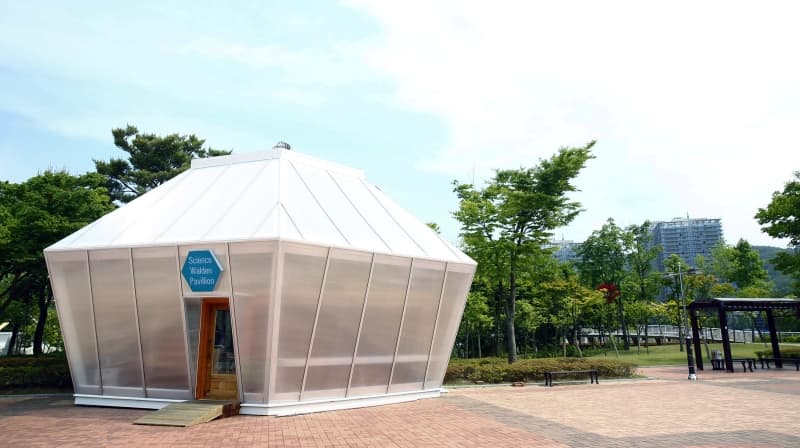Koreans have implemented a public toilet project that will pay for your visit.
On May 25, 2016, on the campus of the National Institute of Science and Technology (UNIST) Ulsan in South Korea opened the Science Walden Pavillion. A huge tent, which apparently does not cause any associations with anything that is connected with high technology, in fact, has every chance to become a prototype of waterless toilets of the future, for visiting which visitors will pay a nominal amount. At first glance, everything said is a bit utopian, however, those who visited the bio laboratory of the project manager, Professor Jaeweon Cho speak about this amazing complex as a promising scientific, cultural and social phenomenon.

Scientists from South Korea showed how a public toilet looks like, made using modern technologies. It is curious that the economic effect that the owners of the establishment receive in the form of biofuels allows them to compensate for the time spent in the institution by visitors in a material equivalent. Of course, the amount looks rather symbolic and is rather cumulative, but the fact and the result achieved is impressive.
Interestingly, Seung-hyun Ko, co-founder of the Korean National Arts Association (YATOO), was the main designer of the project.
')

Scientists did not suggest any breakthrough and innovative ideas and decided to simply use what is already working, having slightly modified the installation scheme. For the production of biofuels and fuels for boiler houses a two-story bio-studio, Science Walden Pavillion with a total area of 122.25 sq. M. uses an anaerobic system.
The grinder inside the fillers dries and crushes the waste to the state of a dry, odorless powder that is subsequently transferred to the anaerobic digestion chamber, where microbes are taken. Here the compost decomposes, generating methane and carbon dioxide. Carbon dioxide is used to cultivate green algae, used later as biofuel, and collected methane can be used in heating systems as fuel for boilers.

The value of the development is not limited to the economic effect of the production of biofuels and methane. Of course, such systems cannot yet offer super-high productivity at this stage of technology development. But if you look at the problem more broadly, and take into account the amount of water and electricity spent on maintaining the functioning of the average public toilet, add the negative effect associated with the spread of intestinal diseases in the warm season, the factor of environmental pollution and the amount of funds spent annually on maintaining treatment facilities, the potential of the biocomplex on the anaerobic platform, such as UNIST, increases by several times.
“Our ultimate goal is not only the creation of an advanced toilet system, which will save water and reduce operating costs at the wastewater treatment plant. It is very important for us to create an ecosystem that, using technological innovations, at the same time encourages economic diversification, where human waste literally acquires financial value, ”summarizes Jaeweon Cho, summarizing the essence of the project concept.
To stimulate the interest of the potential audience in the development of Jaeweon Cho is going financially. And since money is known to love the account, users are invited to download a special smartphone application that can: 1) estimate how much you “earned” per visit, 2) send a fee to the user's current account with an instant electronic transfer. For connoisseurs of a healthy lifestyle in the same place in the pavilion, and in the perspective of the Jaeweon Cho distribution network, it will be possible to convert e-currency into environmentally friendly and inexpensive vegetables.

How thoroughly, thoughtfully and meticulously Korean engineers approached the creation of their Science Walden Pavillion inspires optimism and belief that the technology will not only take root on the campus of one single institution, but will launch its development in the framework of the national, and in the long term - and global trends. Today, this is nothing more than a public demonstration. Interestingly, in the laboratory of this particular institute, a method for extracting methane from coffee grounds was found earlier.
Walden Science Pavilion is open daily from 9 am to 6 pm on the territory of the National Institute of Science and Technology (UNIST) Ulsan in South Korea. The scientific group is open for consultations on the “Associate Professor” program, which you can register for on the official project website.
The project site , where anyone can book a time to visit the center and consultation in the framework of the program "Associate Professor" on weekends.
That's all, with you there was a simple service for choosing sophisticated Dronk.Ru equipment. Do not forget to subscribe to our blog , there will be many more interesting ...


Scientists from South Korea showed how a public toilet looks like, made using modern technologies. It is curious that the economic effect that the owners of the establishment receive in the form of biofuels allows them to compensate for the time spent in the institution by visitors in a material equivalent. Of course, the amount looks rather symbolic and is rather cumulative, but the fact and the result achieved is impressive.
Interestingly, Seung-hyun Ko, co-founder of the Korean National Arts Association (YATOO), was the main designer of the project.
')

Scientists did not suggest any breakthrough and innovative ideas and decided to simply use what is already working, having slightly modified the installation scheme. For the production of biofuels and fuels for boiler houses a two-story bio-studio, Science Walden Pavillion with a total area of 122.25 sq. M. uses an anaerobic system.
The grinder inside the fillers dries and crushes the waste to the state of a dry, odorless powder that is subsequently transferred to the anaerobic digestion chamber, where microbes are taken. Here the compost decomposes, generating methane and carbon dioxide. Carbon dioxide is used to cultivate green algae, used later as biofuel, and collected methane can be used in heating systems as fuel for boilers.

The value of the development is not limited to the economic effect of the production of biofuels and methane. Of course, such systems cannot yet offer super-high productivity at this stage of technology development. But if you look at the problem more broadly, and take into account the amount of water and electricity spent on maintaining the functioning of the average public toilet, add the negative effect associated with the spread of intestinal diseases in the warm season, the factor of environmental pollution and the amount of funds spent annually on maintaining treatment facilities, the potential of the biocomplex on the anaerobic platform, such as UNIST, increases by several times.
“Our ultimate goal is not only the creation of an advanced toilet system, which will save water and reduce operating costs at the wastewater treatment plant. It is very important for us to create an ecosystem that, using technological innovations, at the same time encourages economic diversification, where human waste literally acquires financial value, ”summarizes Jaeweon Cho, summarizing the essence of the project concept.
To stimulate the interest of the potential audience in the development of Jaeweon Cho is going financially. And since money is known to love the account, users are invited to download a special smartphone application that can: 1) estimate how much you “earned” per visit, 2) send a fee to the user's current account with an instant electronic transfer. For connoisseurs of a healthy lifestyle in the same place in the pavilion, and in the perspective of the Jaeweon Cho distribution network, it will be possible to convert e-currency into environmentally friendly and inexpensive vegetables.

How thoroughly, thoughtfully and meticulously Korean engineers approached the creation of their Science Walden Pavillion inspires optimism and belief that the technology will not only take root on the campus of one single institution, but will launch its development in the framework of the national, and in the long term - and global trends. Today, this is nothing more than a public demonstration. Interestingly, in the laboratory of this particular institute, a method for extracting methane from coffee grounds was found earlier.
Walden Science Pavilion is open daily from 9 am to 6 pm on the territory of the National Institute of Science and Technology (UNIST) Ulsan in South Korea. The scientific group is open for consultations on the “Associate Professor” program, which you can register for on the official project website.
The project site , where anyone can book a time to visit the center and consultation in the framework of the program "Associate Professor" on weekends.
That's all, with you there was a simple service for choosing sophisticated Dronk.Ru equipment. Do not forget to subscribe to our blog , there will be many more interesting ...

 |  |  |
| Why do online stores give money for purchases? | Review of Xiaomi Mi Air Purifier 2 or how to clean the air of the metropolis? | Return your money - choose a cashback service for Aliexpress |
Source: https://habr.com/ru/post/395283/
All Articles